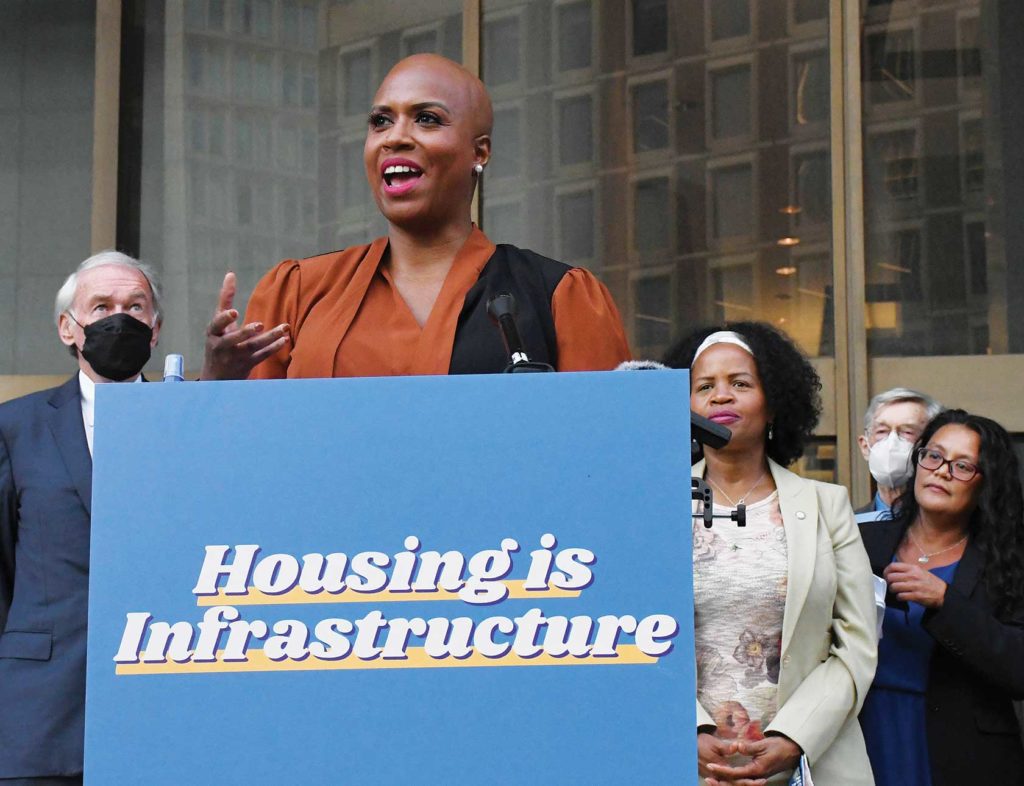Elected officials call for federal housing relief
Janey, congressional reps. say communities need affordable housing

Massachusetts elected officials gathered Wednesday to advocate for the inclusion of funds for housing-related provisions in the Biden administration’s Build Back Better reconciliation bill.
The bill aims to use $3.5 trillion to address a variety of domestic policy priorities, including education, child care and environmental protections. Massachusetts Rep. Ayanna Pressley and Sen. Ed Markey are pushing for it to include funds to improve affordable housing across the country.
Pressley, a member of the House Finance Services Committee, advanced provisions last month that would work toward increasing affordable housing access by providing $90 billion for housing vouchers and $37 billion to the country’s Housing Trust Fund, which provides grants to states to produce and preserve housing for low-income residents. Her provisions would also use $10 billion to help first-time, first-generation home buyers, and another $10 billion to address health issues like lead hazards in housing.
“Housing is an economic justice issue, it is a climate justice issue, it is a healthcare justice issue; housing is a fundamental human right. Period,” Pressley said at Wednesday’s press conference outside of the John F. Kennedy Federal Building. “And for those reasons, housing is infrastructure. It is time that our policies and our budgets reflect that reality.”
At the press conference, Markey described the Build Back Better Act as an opportunity to ensure the country has the funding that he says it needs for housing.
“We have to make sure that we invest so that create, that we preserve, millions of homes, so that we bring down the cost of housing and we improve its conditions,” Markey said. “So, we have to stand fast, we have to invest in American families, we have to invest in the homes and the communities where families live, and as we work to create a Build Back Better package, we must make investments in housing opportunities a central pillar of the plan.”
Both emphasized the impact of the COVID-19 pandemic and the realities of the country’s housing system it laid bare. Pressley called it “a public health crisis within a public health crisis.” Markey noted the importance of having a home during moments of the pandemic in which state and local governments instituted stay-at-home policies.
“The COVID-19 crisis revealed the depth of our country’s affordable housing crisis at the same time that it revealed how important our homes are for health, for our well-being, for our lives,” Markey said.
Kimberly Landaverde, a youth tenant leader with City Life Vida Urbana, described how her parents lost their jobs during the pandemic, putting her family’s housing situation at risk.
“Rent all over Boston is skyrocketing and incomes aren’t rising fast enough,” Landaverde said. “Some of what we have seen have been temporary solutions to long-term issues. What we need is state and federal legislation that invests into affordable, equitable and accessible housing.”
She said the Build Back Better Act would help families like hers who need the assistance — if it includes funding for housing.
“It would ensure that we truly view housing as a human right — one that is worth of investment — allowing parents and families like mine to have access to home ownership and building wealth, helping to reduce the racial wealth gap,” Landaverde said. “This legislation isn’t just about where to invest money, but how to help ensure we have a stable future that is accessible to all, even after this public health crisis.”
Acting Mayor Kim Janey, who appeared at the press conference with Pressley and Markey, said the issue of housing was personal to her, having experienced housing insecurity while growing up and receiving assistance to rent her first apartment and buy her first home.
“Until everyone can afford stable housing and has a pathway to ownership, our work on this issue is not done,” Janey said.
She emphasized the importance of these programs, especially for residents in communities of color. According to a city press release from June, historically in Boston, more than 70% of participants in the city’s programs to help first-time home buyers were households of color.
The inclusion of housing funding in the Build Back Better Act remains in question. Senate Democrats are attempting to enact the bill through the budgetary process of reconciliation, which would allow them to pass it with a 51-person simple majority rather than a 60-person supermajority that would circumvent a filibuster. That, however, requires the support of every democratic senator.
Arizona Sen. Kyrsten Sinema and West Virginia Sen. Joe Manchin have objected a reconciliation bill with a $3.5 trillion price tag.
At the Boston press conference, Markey said he plans to continue to push for the Build Back Better Act with the full amount of funding as proposed.
“We’re advocating for a number, a final number, in the reconciliation bill that is equal to the magnitude of the problems — including housing, including childcare — in our country,” Markey said. “So we’re not giving up.”
Pressley echoed his sentiment.
“We need to go bold,” Pressley said. “We need to go as big and as deep and as broad as the pain is.”






